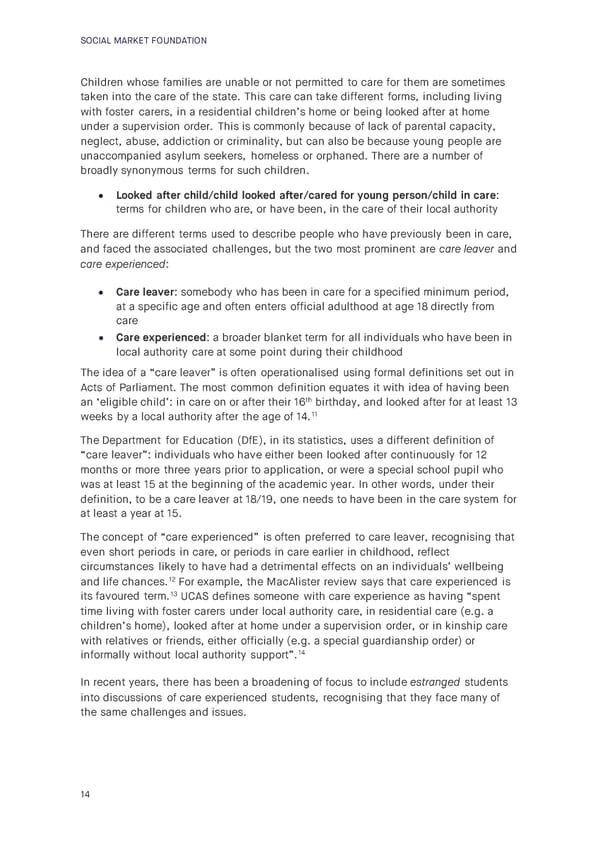SOCIAL MARKET FOUNDATION Children whose families are unable or not permitted to care for them are sometimes taken into the care of the state. This care can take different forms, including living with foster carers, in a residential children’s home or being looked after at home under a supervision order. This is commonly because of lack of parental capacity, neglect, abuse, addiction or criminality, but can also be because young people are unaccompanied asylum seekers, homeless or orphaned. There are a number of broadly synonymous terms for such children. • Looked after child/child looked after/cared for young person/child in care: terms for children who are, or have been, in the care of their local authority There are different terms used to describe people who have previously been in care, and faced the associated challenges, but the two most prominent are care leaver and care experienced: • Care leaver: somebody who has been in care for a specified minimum period, at a specific age and often enters official adulthood at age 18 directly from care • Care experienced: a broader blanket term for all individuals who have been in local authority care at some point during their childhood The idea of a “care leaver” is often operationalised using formal definitions set out in Acts of Parliament. The most common definition equates it with idea of having been th an ‘eligible child’: in care on or after their 16 birthday, and looked after for at least 13 weeks by a local authority after the age of 14.11 The Department for Education (DfE), in its statistics, uses a different definition of “care leaver”: individuals who have either been looked after continuously for 12 months or more three years prior to application, or were a special school pupil who was at least 15 at the beginning of the academic year. In other words, under their definition, to be a care leaver at 18/19, one needs to have been in the care system for at least a year at 15. The concept of “care experienced” is often preferred to care leaver, recognising that even short periods in care, or periods in care earlier in childhood, reflect circumstances likely to have had a detrimental effects on an individuals’ wellbeing 12 and life chances. For example, the MacAlister review says that care experienced is its favoured term.13 UCAS defines someone with care experience as having “spent time living with foster carers under local authority care, in residential care (e.g. a children’s home), looked after at home under a supervision order, or in kinship care with relatives or friends, either officially (e.g. a special guardianship order) or 14 informally without local authority support”. In recent years, there has been a broadening of focus to include estranged students into discussions of care experienced students, recognising that they face many of the same challenges and issues. 14
 Care and Learning in Higher Education Page 14 Page 16
Care and Learning in Higher Education Page 14 Page 16